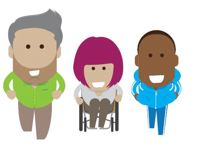What is it?
Most children attend a mainstream school.
This includes many children with special educational needs and disabilities.
What do children learn?
Children are taught the national curriculum. It is adapted for individual children as needed.
A wide range of subjects and GCSEs are offered at secondary school. Sometimes vocational courses are offered alongside GCSEs. Some schools offer A levels.
Who attends?
Most children with special educational needs and disabilities attend a mainstream school.
Children attend who:
- Are on SEN support
- Have an EHC Plan
Most children come from their local area
Schools must make reasonable adjustments for all children to accommodate their needs.

Which needs do they meet?
Mainstream schools will aim to meet all types of special educational needs. This includes autism, mental health, and learning difficulties.
How big are the classes?
On average:
- 27 children in a primary school class
- 22 children in a secondary school class
Children may be taken out of some classes to join small group or 1-2-1 support sessions.
How are children supported?
Children with SEND may have some extra or different learning to meet their needs.
Extra help might include:
- Individual support from a teaching assistant or support in a group.
- Extra help with a particular need, such as a speech and language programme.
- Advice from a visiting specialist who may observe or assess children and their needs. E.g. a speech and language therapist or educational psychologist.
- Help with health conditions such as managing medication, personal care, or toileting.
What is the environment like?
Mainstream schools are usually bigger and busier than special schools. They have classrooms and small rooms, with areas adapted to meet individual needs.
Schools may have sensory or breakout rooms.
Breakfast and after school clubs
Many mainstream schools have a breakfast and after-school club to provide wraparound childcare.
They also provide other after-school clubs such as sport.
You can search for a school using the links in the Search on the Sheffield Directory section below.


